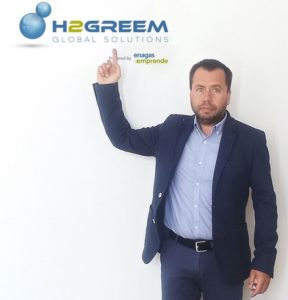Our interview series with the world’s leading entrepreneurs continues, through which we give voice to the people who make it clear that entrepreneurship is an excellent option for doing great things.
On this occasion we spoke with Mario Carrero, CEO of H2Greem, an initiative that has benefited from Enagás Emprende’s support. H2Greem is driving the development, manufacture, and marketing of medium-sized electrolysers in Spain. Electrolysers are devices that produce hydrogen through a chemical process (electrolysis) that separates hydrogen and oxygen molecules from water.
He tells us how he started his business project, how he believes such a venture should be approached, and how H2Greem develops and manufactures hydrogen generators based on PEM (Proton Exchange Membrane) technology.

Mario Carrero, CEO of H2Greem
It arose from the collaboration with Enagás in the installation of the first power to gas pilot scheme in Spain, at the Cartagena plant. The aim of the installation is to produce green hydrogen with a PEM electrolyser. These are the most common electrolysers, as they are the ones that produce high purity hydrogen. They are also the most appropriate ones to adapt to the variability of renewable energies.
Commitment: the entrepreneur has to be extremely committed to their project. If they are not passionate about what they do, it will be difficult for them to achieve their goals.
Leadership: every project needs a leader and every entrepreneurial project needs the entrepreneur to take on this role. Therefore, every entrepreneur must have good leadership skills.
Spotting opportunities: not everyone is able to see opportunities in the market. The ability to search for them and identify them effectively is vital for the entrepreneur, since every project is born from an idea that, almost always, arises after having detected an untapped opportunity.
Risk tolerance: given that any entrepreneurial project involves risks, the entrepreneur inevitably has to tolerate them to a large extent and not fall apart when these risks become more pronounced. They must be able to move forward in spite of any obstacles, for which commitment is also a great asset.
Confidence and creativity: the entrepreneur must have confidence in themself and in the project, supporting it at all times and when faced with adversity. Moreover, they must be highly creative in order for the project to be innovative and fruitful.
Motivation for excellence: no project succeeds in the market if it does not strive for excellence. Entrepreneurs must always look to go one step further with their projects, not just settling for meeting market standards but surpassing themselves and, by extension, their competitors.
Entrepreneurship requires commitment, leadership, spotting opportunities, risk tolerance, confidence, creativity and motivation
Green hydrogen stands out as one of the main solutions to the energy transition, also enabling economic growth due to its flexibility and versatility. It is multifunctional and has the capacity to store, transform, and transport energy without producing CO2 emissions, which, in addition to economic costs, has a significant impact on countries and companies.
The hydrogen economy is here. Technologies linked to the use of green hydrogen are mature, safe, and ready to be rolled out on a large scale
In order for hydrogen production to make a significant contribution to achieving the decarbonisation objectives set by the European Commission for the next 30 years, it is essential to increase the production of green or renewable hydrogen and promote the development of the technologies that enable it.
The hydrogen economy is here. Technologies linked to the use of green hydrogen are mature, safe, and ready to be rolled out on a large scale.
As a result, each EU Member State has had to develop its own integrated national energy and climate plans for the years 2021-2030, which include the strategies to be followed. Spain presented its own plan last January, with general objectives of decarbonisation and energy efficiency, and a series of specific objectives, including those related to low-carbon and clean-energy technologies, such as solar, wind, carbon capture and storage.
For these technologies, a series of Research, Development and Innovation (R&D&I) strategies have been proposed, including the integration of renewable energies and the promotion of hydrogen as an energy vector. The development of a hydrogen economy will therefore represent an opportunity for companies, technology centres, and investors, to create jobs and activate the economy, as well as to achieve the objective of total decarbonisation of the different economic sectors set for 2050.